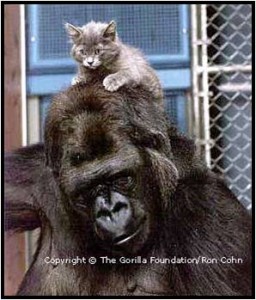
Koko Sign: Transparency good.
Scary science, national security, and open-source research
Maggie Koerth-Baker
BoingBoing, 13 January 2012
I've been following the story about the scientists who have been working to figure out how H5N1 bird flu might become transmissible from human to human, the controversial research they used to study that question, and the federal recommendations that are now threatening to keep that research under wraps. This is a pretty complicated issue, and I want to take a minute to help you all better understand what's going on, and what it means. It's a story that encompasses not just public health and science ethics, but also some of the debates surrounding free information and the risk/benefit ratio of open-source everything.
. . . . . . .
I make the same argument today that we made in 2005 — publishing those experiments without the details is akin to censorship, and counter to science, progress and public health. … Giving the full details to vetted scientists is neither practical nor sufficient. Once 20–30 laboratories with postdoctoral fellows and students have such information available, it will be impossible to keep the details secret. Even more troublesome, however, is the question of who should decide which scientists are allowed to have the information. We need more people to study this potentially dangerous pathogen, but who will want to enter a field in which you can't publish your most scientifically interesting results?
Phi Beta Iota: From 1990-1994 various parties tried to censor Peter Black, Winn Schwartau, Robert Steele, and others laying out the grave dangers that lay in cyberspace if the US Government continued to be stupid about it. In 1994 Steele finally assembled a one billion dollar a year budget from four world-class experts and delivered it to Marty Harris. Nothing was done. Secrecy kills. Secrecy not only keeps vital information from being shared with those able to do something about it whom we do NOT know beforehand, but secrecy also allows grotesquely inept and unethical programs to survive absent accountability.
See Also:
Site Search 1994 Sounding the Alarm



